This booklet featured items produced by students at the school for sale to the public…
Native Art and Industry Program
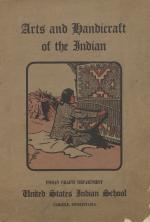
![Students Working in a Weaving Studio [version 1], c.1910 Students Working in a Weaving Studio [version 1], c.1910](/sites/default/files/styles/views_taxonomy/public/image-photo/00314A%2312.jpg?itok=VGneB5R2)
Male and female students posed working at desks and some working with fabric on a vertical loom. On a bulletin board and black board are examples of Native-style design motifs.
Note: This negative is in the Cumberland County Historical Society's A. A. Line Collection, which contains images either taken or collected by Line. At some…
![Students Working in a Weaving Studio [version 2], c.1910 Students Working in a Weaving Studio [version 2], c.1910](/sites/default/files/styles/views_taxonomy/public/image-photo/00314A%2330.jpg?itok=wLQRDrrT)
Male and female students posed working at desks and some working with fabric on a vertical loom. On black boards are examples of Native-style design motifs.
Note: This negative is in the Cumberland County Historical Society's A. A. Line Collection, which contains images either taken or collected by Line. At some point, either…

Part of a scrapbook compiled by William Winneshiek (Winnebago), who wrote the caption: Learning Dressing Making + Weaving.
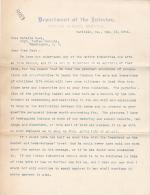
Richard Henry Pratt informs Estelle Reel that the Carlisle Indian School does not have any native industries and arts programs at the school. He further goes on to strongly criticize the effort.
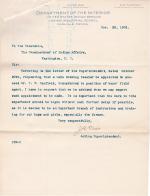
J. R. Wise follows up on William A. Mercer's request to have a male drawing teacher appointed to the vacancy caused by the transfer of Fred W. Canfield. A note from J. H. Dortch refers to Commissioner Frances E. Leupp's plan to have Angel De Cora fill the position.
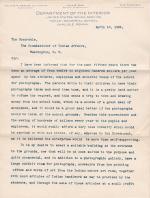
William A. Mercer requests to use the bequest of Harriet W. Taber to build a photographic gallery or art building at the entrance of the Carlisle Indian School.
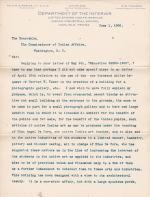
William A. Mercer elaborates on his plan for building a photographic gallery at the entrance to the Carlisle Indian School using the bequest of Harriet W. Taber. Mercer states that he has already begun construction using athletic funds.
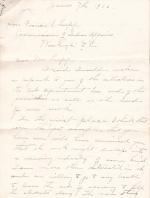
Angel De Cora makes a report on the art department of the Carlisle Indian School to Francis E. Leupp. De Cora requests to spend the summer learning how to make Persian rugs as well as allowing students the option of copyrighting their designs to profit from their work.
In addition there are two Office of Indian Affairs notes indicating…
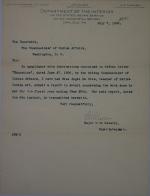
Angel De Cora submits a report on her first five months in charge of the Native Arts Industry at the Carlisle Indian School to William A. Mercer.
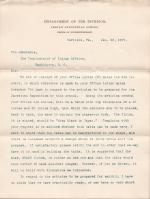
J. R. Wise responds to an Office of Indian Affairs letter regarding the Jamestown Exposition. Wise provides a list of articles to be provided by the Carlisle Indian School as well as building the exhibition cases. In addition, Wise states that the Johnston photographs can be used along with newer photos along with Native work from Angel De Cora…
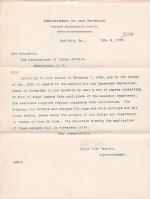
William A. Mercer informs the Office of Indian Affairs that he has forwarded by separate mail papers consisting of papers from the academic department along with items from Angel De Cora's Indian Art Department.
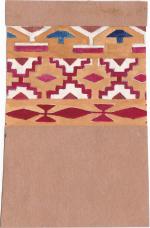
J. R. Wise provides further information to the Office of Indian Affairs regarding the design of Indian Office exhibit at the Jamestown Exposition. Wise also encloses a frieze designed by Angel De Cora for the walls of the exhibit and asks for the Office to procure burlap for the walls.
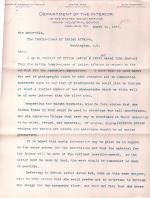
William A. Mercer requests early information regarding the Jamestown Exposition Indian Office exhibit. Mercer requests to be allowed to use newer photographs in addition to those taken by Frances Benjamin Johnston along with using Navajo blankets to decorate the wall.
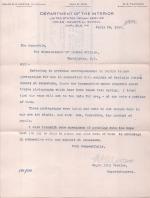
William A. Mercer informs the Office of Indian Affairs newly produced photographs taken by students at the Carlisle Indian School along with items from the printing department for the exhibit at the Jamestown Exposition have been forwarded to their Office.
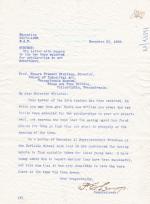
Howard Fremont Stratton, Director of the Art Department at the School of Industrial Art of the Pennsylvania Museum, asks Commissioner of Indian Affairs Cato Sells why the Bureau of Indian Affairs does not pay the living expenses of Indian students, many of whom formerly attended Carlisle, accepted to his school. Stratton also forwards Sells an…
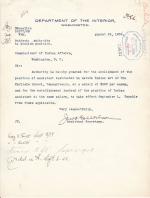
Assistant Secretary of the Interior authorizes the Commissioner of Indian Affairs to abolish the position of Assistant Instructor in Native Indian Art and establish the position of Indian Assistant at the Carlisle Indian School.
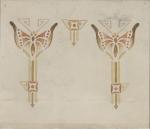
Student work from art class. Includes paintings of geometrical designs by C. M. Battise. Also includes a drawing of a teacup and milk bottle by Anna J. Roulette, Junior; a still life drawing of flower stems by Harrison Smith, Junior; and a painting entitled "Study in color harmony" with geometric and floral design work by Lillian Rice.
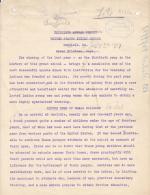
These materials include correspondence and a draft of Superintendent Friedman's 30th Annual Report for the Carlisle Indian School, reflecting the period ending July 31, 1909. Friedman forwarded the draft to a Bureau official, along with information on how to have news published in Carlisle's student newspaper. The annual report includes…
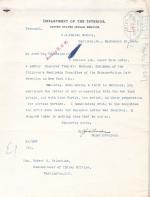
Moses Friedman forwards a letter to Robert G. Valentine from Samuel Parsons, the chair of the Children's Festivals Committee of the Hudson-Fulton Celebration in New York City. Following up on a previous conversation, Parsons regrets that they do not have the funds to work with Angel De Cora Dietz and Lonestar Dietz for the festival.
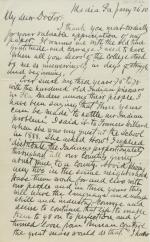
Richard Henry Pratt thanks Dr. Charles Francis Himes for his comments on his paper and his previous support from Dickinson College. Pratt comments on his work at the Carlisle Indian School and the formation of his policy at Fort Marion. Further, he details the outing program and its benefits for assimilation compared to the new policy of native…
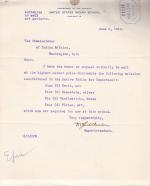
Carlisle Indian School Superintendent Moses Friedman requests to sell nine art bowls, five silver bracelets, six brass candlesticks, and four art plates manufactured in the Native Indian Art Department. Commissioner of Indian Affairs R. G. Valentine grants permission.
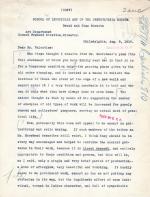
Robert G. Valentine compliments Howard Fremont Stratton, Director of the Art Department at the Philadelphia School of Industrial Art of the Pennsylvania Museum, for his article published in The Red Man. Stratton thanks Valentine for the kind words about his article, which was about "Indian education in art," and discusses the…
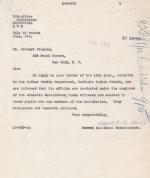
Printing Manufacturer Herbert Bingham encloses an advertisement (apparently for Navajo rugs) to the Commissioner of Indian Affairs and asks if it is fraudulent, He is suspicious because the government appears to be making a profit on the sale of the items. Second Assistant Commissioner informs Bingham that it is legitimate and that it is…
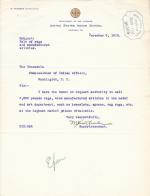
Carlisle Indian School Superintendent Moses Friedman requests to sell 8,000 pounds of rags and manufactured articles in the metal and art departments. Assistant Commissioner of Indian Affairs F. H. Abbott grants permission.
